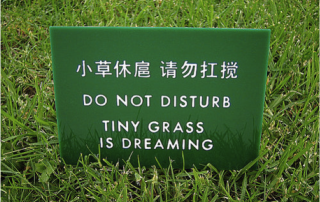Every English-speaking tourist in China has, no doubt, come across his or her fair share of 'Chinglish' -- that is, strangely worded, messy translations of English, as seen on signage, restaurant menus, clothing, and so on. There are information booths marked by signs reading 'question authority', handicapped restrooms labeled 'deformed man toilet', and extra large sizes at restaurants defined as 'lard bucket'. The acceptability of mistake-ridden Chinglish translations has been widely debated: on the one hand, Chinglish interpretations are fundamentally incorrect, and thus, in theory, should be eliminated. But on the other hand, Chinglish is a unique and intriguing phenomenon,which provides us with fascinating insight into the way in which the Chinese think about language.
Lost in (Online) Translation
Those who have studied the Chinglish phenomenon are quick to pin most responsibility on an over-reliance on flawed translation software. As anyone who has used an online translator can empathize, these sites often produce vastly inaccurate results. Traditionally, they have worked by matching up Chinese and English words with the most similar meanings. These direct translations fail to take into account the intricacies of grammar, syntax, word order, vocabulary, and idiomatic expressions. The results may seem logical, but are inherently arbitrary.
In Beijing, I came across a particularly amusing example of the consequences of relying on these kinds of translation services. A restaurant owner wanted to hang up an English sign, so he ran the restaurant's name through a translation website. The result? A huge, capitalized banner reading, 'TRANSLATE SERVER ERROR'.
Another source of the problem is the imprudent way in which the Chinese learn English. Unfortunately, many English language textbooks contain basic mistakes, which worsen Chinese people's understanding of English, and exacerbate the problem of Chinglish. With an imperfect foundation of the language, it is no surprise that mangled Chinglish interpretations are so pervasive.
Government Efforts to Stamp Out Chinglish
The Chinese government has taken a hostile stance towards Chinglish, criticizing it by arguing that 'signage is to be useful, not amusing'. Leading up to the 2008 Olympic games in Beijing, there was a campaign to modify sloppy Chinglish signs in the city, resulting in the revision of 400,000 street signs and 1,300 restaurant menus. However, not everyone shares this degree of disapproval.
Many believe that Chinglish should not be viewed as an embarrassment to the purity of the English language, but rather, as a humble and charming effort to appeal to foreign English speakers. Moreover, it gives us a new lens through which to view the mundane words that surround our day-to-day lives. It should not be characterized by its linguistic inferiority, but by its fascinating idiosyncrasies and quirks. I don't know of many English speakers who wouldn't find it refreshing to read 'the slippery are very crafty' instead of 'wet floor' at a subway station. The meaning of the words is (more or less) preserved, and if nothing else, it brings a smile to your face.
Finding Merit in the Silliness
One news article refers to Chinglish as 'English's sprightly, unpredictable cousin'. I think this description could not be more apt. Chinglish is often ridiculous and nonsensical, but it can be a lot more lively and dynamic than conventional English phrases: in one park, the words 'keep off the grass' become the poetic phrase, 'the little grass is sleeping. Please don't disturb it or don't hurt me. I am afraid of pain'. As Oliver Lutz Radtke, a German reporter who is regarded as a world expert on Chinglish, wrote in the New York Times, 'if you standardize all these signs, you not only take away the little giggle you get while strolling in the park, but you also lose a window into the Chinese mind'.
Deciphering a foreign language poses many difficulties. As foreign students of Chinese, I'm sure this is something that we can all relate to. Chinglish is a pronounced, unabashed attempt at English, which serves as a light-hearted reminder not to take mistakes and imperfections too seriously. In this way, it promotes a spirit of being unafraid to make an attempt, no matter how futile that attempt might be. And for this, it should be appreciated.
by Sasha Small
Marketing Assistant Intern
Don't miss out on more articles and news about Hutong School, the Chinese language, life in China and much more.
Learn Chinese in China
